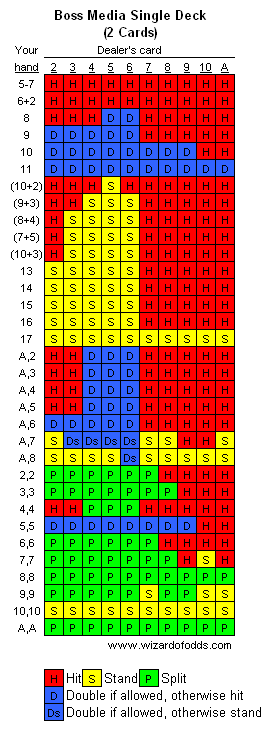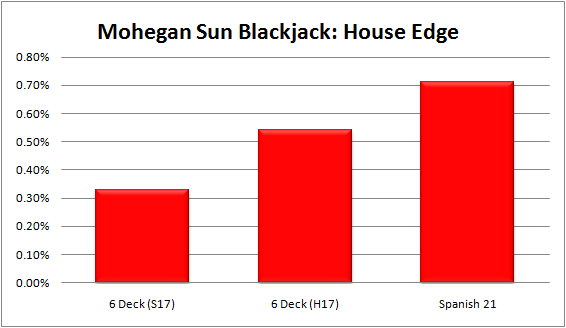Double Deck Blackjack Counting Strategy
Posted By admin On 14/04/22- Double Deck Blackjack Counting Strategy Games
- Double Deck Blackjack Counting Strategy Rules
- Double Deck Blackjack Counting Strategy For Beginners
- Double Deck Blackjack Counting Strategy Strategies
- If you do that without card-counting, you will still lose, albeit slowly. With the most favorable house rules, you will still be at a negative EV. It will be very small (on the order of one percent), but you will still be a long-term loser.
- What that means is, if you begin at zero and count down the entire deck using the Knockout Card Counting Strategy, you are not going to finish on zero. In the Hi-Lo method, the seven is neutral, however, it is a plus one in the Knock Out blackjack counting method, and therefore adds four more points to the deck.
There are some good double-deck blackjack games with a very low house edge against a basic strategy player (as low as 0.14%). The double-deck basic strategy is rule dependent, meaning it’s slightly different depending if the rules are S17 or H17 with DAS or NDAS.
Double Deck Blackjack Counting Strategy Games
I'm currently in the process of switching to the HiLo system and I mostly play Double Deck, H17, DA2, DAS upto 4 hands, No Surrender. Ideally I would like to know the index plays for -6 to +6 for this game. I18 for this game would be fine as well. Could someone please provide this information for me please? Is there a computer program that lists the index plays for number of decks and rules and counting system used? Thank you for your help.CVCX and CVBJ have index numbers. Or look online.
Take Insurance at +3
8 dbls against 4 (+5)
8 dbls against 5 (+3)
8 dbls against 6 (+1)
9 dbls against 2 (+1)
9 hits against 3 (-1)
9 hits against 4 (-3)
9 hits against 5 (-5)
9 dbls against 7 (+3)
10 hits against 8 (-5)
10 hits against 9 (-2)
10 dbls against 10 (+4)
10 dbls against Ace (+3)
11 hits against 9 (-5)
11 hits against 10 (-5)
11 dbls against Ace (0)
12 stands against 2 (+3)
12 stands against 3 (+1)
12 hits against 4 (0)
12 hits against 5 (-2)
12 hits against 6 (-4)
13 hits against 2 (-1)
13 hits against 3 (-3)
13 hits against 4 (-5)
13 hits against 5 (-5)
14 hits against 2 (-4)
15 stands against 10 (+4)
15 stands against Ace (+5)
16 stands against 9 (+5)
16 stands against 10 (0)
16 stands against Ace (+3)
There are more if you want the deviations for splits & soft hands (most players don't). Would you like me to provide them?

9 dbls against 2 (+1)
iirc it's standard BS to double 9 against 2 in a DD game

You're switching to HiLo? What were you using before?
CVCX and CVBJ have index numbers. Or look online.
I'd like to know as well. Although it wasn't asked, I think I'd be remiss not to point out that Hi-Lo is not the best count for double deck. If a change is being made then perhaps this is a good time to look into something else.

Lots of times, people look at different counting systems and compare EV and difficulty. Both are definitely necessary to take into consideration, but, I think people tend to overestimate the strength of EV when deciding a count.
Better yet, you should look at numbers like N0, variance/std dev, SCORE, etc.
The main problem with HiLo is that it values all 2-6's equally (and Tens and Aces equally as well). This is a bit of a problem, especially when playing single or double deck games, as 2's and 6's are not equal (they have significantly different EORs).
If the cards were evenly distributed in the shoe, then yeah, HiLo would work fine -- but remember, you gain your edge when the cards are NOT evenly distributed throughout the shoe. You gain an edge when they are distributed unequally (little cards up front, aces/faces in the back).
In my opinion, if you're ONLY going to play single/double deck, you should learn something like HiOptII w/ ASC (Ace Side Count). If you're going to play primarily pitch games and play a little shoe games (or might play shoes in the future), then learn something like the Zen count. Personally, I like Zen count -- it's strong enough for pitch games but is also easy enough for shoe games. Granted, it is more difficult than HiLo, but not significantly. If I were you, I'd learn Zen.
But really -- buy CVCX, it's like $100 max. Run a bunch of sims using different counts, different games/rules/spreads/etc. Look at numbers like EV/hour, N0, and SCORE. IMO, that's the best way to determine which counting system you should learn.
At first glance, it would seem only logical that a smart player will do better at a game that uses fewer decks, but that’s not always the case when you compare double-deck games with six-deck games. A lot of variables come into play, not the least of which are the rules of the games, the minimum bet size required and the amount of scrutiny the games get from casino supervisory personnel. If you do not count cards, it’s very likely that you’ll be better off avoiding the double-deck games out there. I know some of you may be surprised by that comment, but I make it based upon the fact that many casinos have less liberal rules on their double-deck games, yet they require higher minimum bets. As a result, the casino’s overall edge may be similar to that of their six-deck game, but you’ll have to bet more on every hand for the privilege of playing. Because a non-counter cannot get a long-term edge over the casino, you’ll just be betting more on a consistent basis and the casino will eventually get your $$$.
Now don’t get me wrong here; if the rules are the same, a game using two decks will have a lower casino edge than one that uses six-decks, yet the strategies are almost identical. If the minimum bets are the same (or are at least within your comfort level), then go with the 2-decker. That’s a key point, by the way. The proper Basic Strategy for a double-deck game closely resembles that of a four- or six-deck game, much more so than a single-deck game. The few differences between a two-deck and six-deck game with the same rules (dealer hits or stands on soft 17, double after split is allowed, etc.) lie mainly in splitting pairs and, since pairs are the rarest hands you’ll get, the impact is negligible. I might be wrong about this, so check, but I do believe that the only change is to split a pair of 7s against a dealer’s 8 in a double-deck game. In a six-decker, you don’t do that. Not a hand you’re going to see everyday, either way.
There are indeed only a handful of changes in strategy between the 6-deck and the 2-deck game. In a 2-deck S17 game: Split 77v8, Split 66v7, and Double 9v2. If the game is H17, also double A3v4.

Double Deck Blackjack Counting Strategy Rules
My point is that you can move back and forth between DD and 6D games and not worry that you’re playing improperly, but the big question is whether or not you should. We’ve already covered the non-counter situation, so let’s turn our attention to those of you who do count. Even in this situation, the double-deck game isn’t necessarily the hands-down choice and I’ll show you why as we go along.
Double Deck Blackjack Counting Strategy For Beginners
For whatever reason, many casinos treat their double-deck games as “premium” games, so they have higher minimum bets, may have less liberal rules, less favorable penetration and are usually watched more closely by the “pit critters”, as we lovingly call them here. Some casinos seem to think that counters are showing up in droves at their DD games and carting off chips by the box load, but that’s not necessarily the case. I know of some games that are very easy to beat, but they are few and far in-between. The reality is that beating the double-decker takes extra effort and some sharp play by the counter. But you came here for answers and I have them.

Double Deck Blackjack Counting Strategy Strategies
The primary advantage to playing a double-deck game is the volatility of the count. Unlike a 4- or 6-deck game, the running count, which is converted to the True Count (count per remaining deck) in a DD game can rise or fall quickly, but it’s gone almost as fast, due to the shuffle. That’s obviously good when the count is negative, but no fun at all when the count is “up”. Things happen quickly in a DD game and the wise counter takes advantage, but it requires good skills at converting to the True Count and almost needs some ability to anticipate what’s going to happen, while remembering that we never make guesses when counting.